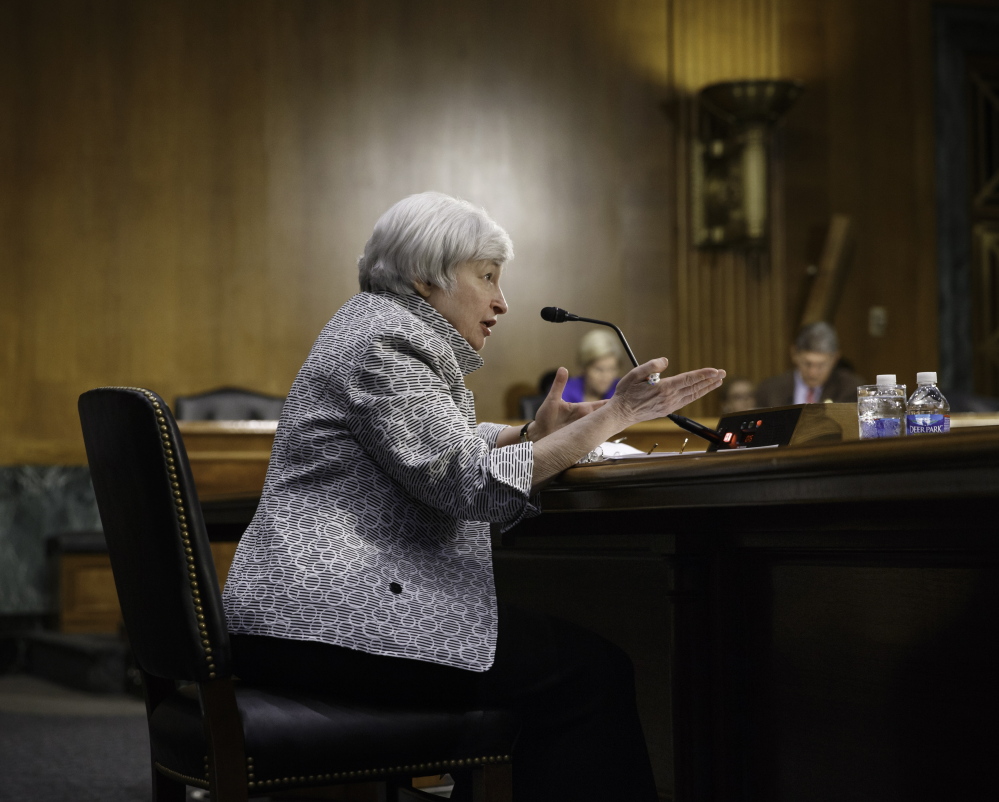WASHINGTON — Federal Reserve Chairwoman Janet Yellen told lawmakers Tuesday that the central bank must press on with monetary stimulus because “significant slack” remains in labor markets and inflation is still below the Fed’s goal.
“A high degree of monetary policy accommodation remains appropriate,” Yellen said in semi-annual testimony to the Senate Banking Committee. “Although the economy continues to improve, the recovery is not yet complete.”
Yellen cited labor-market weaknesses even after an unexpectedly fast decline in unemployment put pressure on Fed officials to consider accelerating their timetable for an interest-rate increase. Yellen said rates are likely to stay low for a “considerable period” after bond purchases end, which she said could happen following the Fed’s October meeting.
While the economy appears likely to rebound from a first-quarter contraction, Yellen said the progress “bears close watching.” Signs of labor-market slack include slow wage growth and low labor-force participation, Yellen said. Housing “has shown little recent progress” as higher mortgage rates discourage buyers.
“There are mixed signals concerning the economy,” Yellen said in response to questions. “We need to be careful to make sure that the economy is on a solid footing before raising interest rates.”
Unemployment fell to an almost six-year low of 6.1 percent last month, close to the level most Fed officials predicted for the end of the year. Payrolls surged by 288,000 workers, boosting the average monthly advance so far this year to almost 231,000.
Even so, some of the labor-market gauges watched by Yellen show continued weakness. The participation rate, which measures the share of working-age people in the labor force, was 62.8 percent last month, matching the lowest since 1978. Among the unemployed, about a third have been out of work for six months or longer.
Even before the latest jobs report, Federal Open Market Committee participants raised their projections for the level of the main interest rate over the next two years, while continuing to predict that the first increase would occur next year.
Their median estimates, released last month, called for an increase to 1.13 percent at the end of 2015 and 2.5 percent a year later. In March, they estimated that the rate would rise to 1 percent by the end of next year and 2.25 percent at the end of 2016.
Economists are predicting growth will snap back from a first-quarter contraction as an improving job outlook and stock- market gains boost consumer confidence and spending.
Gross domestic product will expand 3.1 percent from July through December following a 3.3 percent advance last quarter, according to the median forecast of 74 economists polled by Bloomberg from July 3 through July 9. It would be the first time since 2004-2005 that GDP has sustained such gains over an extended period.
“Economic activity will expand at a moderate pace over the next several years, supported by accommodative monetary policy, a waning drag from fiscal policy, the lagged effects of higher home prices and equity values, and strengthening foreign growth,” Yellen said.
A pickup in inflation toward the central bank’s 2 percent objective also has prompted some officials to say the Fed may have to consider tightening sooner. The Fed’s preferred gauge, the personal consumption expenditures index, rose 1.8 percent from a year earlier in May, the most in 19 months.
“Inflation has moved up in recent months but remains below the (Federal Open Market Committee’s) 2 percent objective for inflation over the longer run,” Yellen said.
Officials, including St. Louis Fed President James Bullard and Philadelphia’s Charles Plosser, have said stimulus may eventually fuel inflation beyond the Fed’s goal. Yellen dismissed that concern at her June news conference, calling recent data on price increases “noise.”
“There’s a very wide gulf between recent economic data and the Fed’s party line, which is that they’re going to hold the foot to the accelerator a bit longer,” Guy LeBas, chief fixed-income strategist in Philadelphia at Janney Montgomery Scott, which oversees $11 billion in fixed-income assets, said before Yellen’s testimony. “The thing that’s going to cause the Fed to accelerate the easing time frame is inflation risk.”
Yellen, 67, served as a Fed governor, San Francisco Fed President and Fed vice chair before succeeding Ben S. Bernanke in February. She is scheduled to appear before the House Committee on Financial Services at 10 a.m. Wednesday in Washington.
Send questions/comments to the editors.



Success. Please wait for the page to reload. If the page does not reload within 5 seconds, please refresh the page.
Enter your email and password to access comments.
Hi, to comment on stories you must . This profile is in addition to your subscription and website login.
Already have a commenting profile? .
Invalid username/password.
Please check your email to confirm and complete your registration.
Only subscribers are eligible to post comments. Please subscribe or login first for digital access. Here’s why.
Use the form below to reset your password. When you've submitted your account email, we will send an email with a reset code.